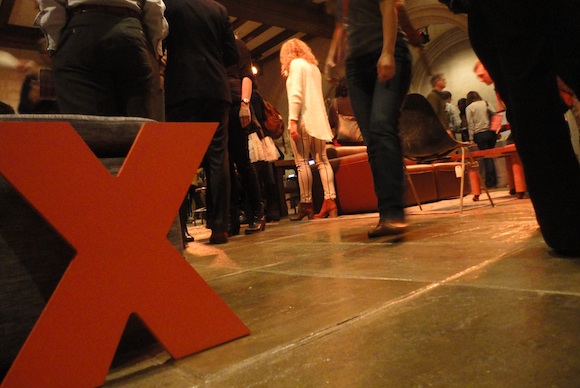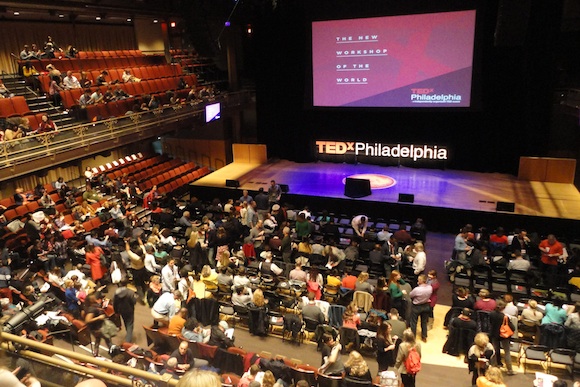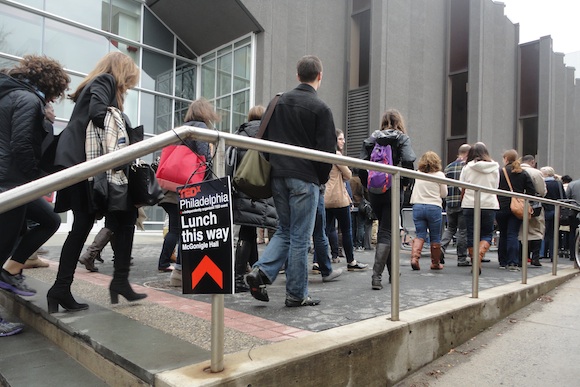Heading to lunch at 2014’s TEDx Philadelphia

TEDx Philadelphia at Temple University

Heading to lunch at 2014’s TEDx Philadelphia

TEDxPhiladelphia conference made a grand reappearance last Friday at Temple University's Performing Arts Center in North Philly.
The day-long event kicked off at 9 a.m., and ended with a food-and-drinks infused reception that lasted well into the evening. The program included speeches, lectures and the occasional rant from more than 20 Philadelphians, all responsible for some of the city's most important cultural, creative, educational and political work.
The four separate “workshops” — which consisted of four or five monologue-style speeches each — were broken up by brief videos and live performances from two proto-jazz musicians, Philadelphia's 79-year-old former poet laureate and even an entire high school drumline.
Many of the independently produced TEDx events, which take place throughout the world, are organized around a specific theme. This year's TEDxPhilly conference took that concept a step further, offering nothing less than a new citywide manifesto.
“The New Workshop of the World” was the official theme. The vast majority of the day's speakers organized their “ideas worth spreading” (as the TED talks are known) around the philosophy that while Philly was once known as the Workshop of the World because of its industrial and manufacturing prowess, today the city's most crucial export is creativity — and life-altering ideas its essential products.
Indeed, photojournalist Jim MacMillan, who spoke about the violence-prevention work being done by his organization Gun Crisis, characterized the day's collective call-to-action best. He presented the sold-out audience with two simple questions as he wrapped up his early-afternoon talk: “What are you going to do that really matters?” he asked. “And how are you going to wait another day?”
* * *
There were so many inspiring and eye-opening talks during TEDxPhiladelphia that it feels impossible to point towards a single speaker as the day's best.
Still, it would hard to argue that Chris Bartlett, who runs the William Way LGBT Community Center and served as emcee of the city's first two TEDxPhilly events, didn't steal the show.
Bartlett's talk, titled “A Tale of Two Neighborhoods,” looked at the cultural history and the development-related activism in Philadelphia's Gayborhood and its Chinatown. He suggested that possessing the passion — and even the style — to fight for the future of a neighborhood is a vital trait when it comes to maintaining unique cities. Bartlett underscored his point by showing a photo of the Chinatown district in Washington, D.C., which has been reduced to little more than a subway stop on the city's Metro line.
Below, a small sampling of the day's most igniting speakers, and the ideas they shared:
With all the focus schools have been placing on test-taking, “we're not really going to succeed in nurturing our students,” argued Nikki Adeli, a junior at Philadelphia's Science Leadership Academy (SLA). Easily the youngest speaker of the day — and one of the most poised — Adeli suggested that SLA's Individualized Learning Plan (ILP) program, in which students spend one afternoon each week interning with a local company of their choice,or pursuing a passion project, be instituted as a graduation requirement for all Philly schools.
Austin Seraphin, a computer-programmer who has been blind since birth, offered one of the conference's most inspiring and unexpected talks, which looked at the intersection of technology and accessibility issues. With his Braille Street Art project, Seraphin has made the urban environment more accessible to the blind; he's also designed touch tours for the blind at Penn's Museum of Anthropology and Archeology. He's currently working on the development of various accessible mobile apps for the iPhone.
As a result of the incredibly life-affirming work being done at the YouthBuild Philadelphia Charter School, the school's former high school dropouts — once routinely referred to in the local press as “at-risk youth” — are now being described as “opportunity youth.” “I don't have all the answers,” said executive director Simran Sidhu who shared countless stories of once-wayward kids who have gone on to transform their lives. “What I do have are all these wonderful bits of data that we should start listening to, and believing in.”
To learn more about the ideas shared at this year's conference (such as the astonishing work being done by Katherina Rosqueta at The Center for High Impact Philanthropy or the eye-popping wearable tech being created by Geneviève Dion and her colleagues at Drexel's Shima Haute Technology Lab), check out tedxphilly.com. And keep your eyes on the site for details about upcoming extracurricular TEDx programming taking place throughout the year.
↑ Top
The day-long event kicked off at 9 a.m., and ended with a food-and-drinks infused reception that lasted well into the evening. The program included speeches, lectures and the occasional rant from more than 20 Philadelphians, all responsible for some of the city's most important cultural, creative, educational and political work.
The four separate “workshops” — which consisted of four or five monologue-style speeches each — were broken up by brief videos and live performances from two proto-jazz musicians, Philadelphia's 79-year-old former poet laureate and even an entire high school drumline.
Many of the independently produced TEDx events, which take place throughout the world, are organized around a specific theme. This year's TEDxPhilly conference took that concept a step further, offering nothing less than a new citywide manifesto.
“The New Workshop of the World” was the official theme. The vast majority of the day's speakers organized their “ideas worth spreading” (as the TED talks are known) around the philosophy that while Philly was once known as the Workshop of the World because of its industrial and manufacturing prowess, today the city's most crucial export is creativity — and life-altering ideas its essential products.
Indeed, photojournalist Jim MacMillan, who spoke about the violence-prevention work being done by his organization Gun Crisis, characterized the day's collective call-to-action best. He presented the sold-out audience with two simple questions as he wrapped up his early-afternoon talk: “What are you going to do that really matters?” he asked. “And how are you going to wait another day?”
* * *
There were so many inspiring and eye-opening talks during TEDxPhiladelphia that it feels impossible to point towards a single speaker as the day's best.
Still, it would hard to argue that Chris Bartlett, who runs the William Way LGBT Community Center and served as emcee of the city's first two TEDxPhilly events, didn't steal the show.
Bartlett's talk, titled “A Tale of Two Neighborhoods,” looked at the cultural history and the development-related activism in Philadelphia's Gayborhood and its Chinatown. He suggested that possessing the passion — and even the style — to fight for the future of a neighborhood is a vital trait when it comes to maintaining unique cities. Bartlett underscored his point by showing a photo of the Chinatown district in Washington, D.C., which has been reduced to little more than a subway stop on the city's Metro line.
Below, a small sampling of the day's most igniting speakers, and the ideas they shared:
With all the focus schools have been placing on test-taking, “we're not really going to succeed in nurturing our students,” argued Nikki Adeli, a junior at Philadelphia's Science Leadership Academy (SLA). Easily the youngest speaker of the day — and one of the most poised — Adeli suggested that SLA's Individualized Learning Plan (ILP) program, in which students spend one afternoon each week interning with a local company of their choice,or pursuing a passion project, be instituted as a graduation requirement for all Philly schools.
Austin Seraphin, a computer-programmer who has been blind since birth, offered one of the conference's most inspiring and unexpected talks, which looked at the intersection of technology and accessibility issues. With his Braille Street Art project, Seraphin has made the urban environment more accessible to the blind; he's also designed touch tours for the blind at Penn's Museum of Anthropology and Archeology. He's currently working on the development of various accessible mobile apps for the iPhone.
As a result of the incredibly life-affirming work being done at the YouthBuild Philadelphia Charter School, the school's former high school dropouts — once routinely referred to in the local press as “at-risk youth” — are now being described as “opportunity youth.” “I don't have all the answers,” said executive director Simran Sidhu who shared countless stories of once-wayward kids who have gone on to transform their lives. “What I do have are all these wonderful bits of data that we should start listening to, and believing in.”
To learn more about the ideas shared at this year's conference (such as the astonishing work being done by Katherina Rosqueta at The Center for High Impact Philanthropy or the eye-popping wearable tech being created by Geneviève Dion and her colleagues at Drexel's Shima Haute Technology Lab), check out tedxphilly.com. And keep your eyes on the site for details about upcoming extracurricular TEDx programming taking place throughout the year.
DAN ELDRIDGE is news editor at Flying Kite Media and the author of Moon Pittsburgh (Avalon Travel). His work has appeared in The New York Times, Columbia Journalism Review, and The Daily Telegraph. Follow him on Twitter at @YoungPioneers.
Region(s):
Southeast
Region: Southeast
Categories
Energy, Entrepreneurship, Features, Higher Ed, Life Sciences, Manufacturing, Philadelphia, Venture Capital
